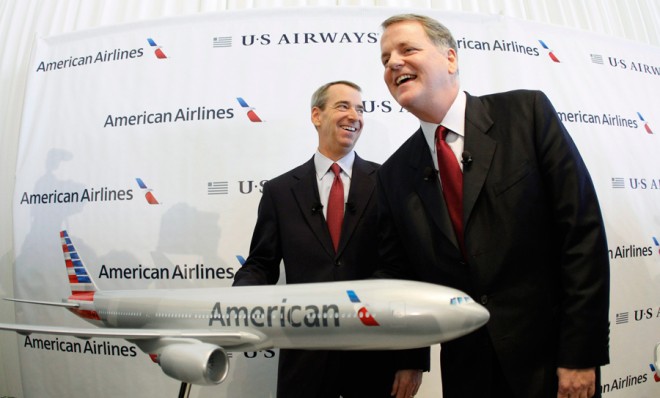Why the feds want to block the U.S. Airways-American Airlines mega-merger
The DOJ says the deal poses "substantial harm" to consumers

A free daily email with the biggest news stories of the day – and the best features from TheWeek.com
You are now subscribed
Your newsletter sign-up was successful
After ten straight years of giant airline mergers, the federal government is putting its foot down over a deal to combine US Airways and American Airlines into the largest airline in the world.
On Tuesday, the Department of Justice, joined by the attorneys general from six states, filed suit to prevent the $11 billion merger, saying it would result in higher fees and less services for passengers, and squeeze out competition in local markets. At Ronald Reagan Washington National Airport, for example, the mega-airline would control 69 percent of takeoff and landing slots, according to the DOJ.
Though the DOJ has made a renewed push to aggressively pursue anti-trust cases, the latest suit comes as a surprise. Not only had European regulators already approved the deal, but the DOJ has been green-lighting airline mergers and acquisitions for the last decade, with very few snags. US Airways merged with America West Airlines in 2005; Delta acquired Northwest Airlines in 2010; and United merged with Continental in 2011.
The Week
Escape your echo chamber. Get the facts behind the news, plus analysis from multiple perspectives.

Sign up for The Week's Free Newsletters
From our morning news briefing to a weekly Good News Newsletter, get the best of The Week delivered directly to your inbox.
From our morning news briefing to a weekly Good News Newsletter, get the best of The Week delivered directly to your inbox.
So what makes this one different? At the time of those mergers, the airline industry was hemmoraging money, and the deals were seen as necessary for survival. Now, airlines for the most part are back on track.
"If this merger goes forward, even a small increase in the price of airline tickets, checked bags or flight change fees would result in hundreds of millions of dollars of harm to American consumers," said Bill Baer, assistant attorney general in charge of the DOJ's antitrust division. "Both airlines have stated they can succeed on a standalone basis and consumers deserve the benefit of that continuing competitive dynamic."
This is patently untrue, says Todd Robberson at Dallas Morning News. American Airlines is still in chapter 11 bankruptcy proceedings. "Without this merger, American will become a radically reduced airline, and passengers will suffer substantially," he says.
Would the merger reduce competition? Well, it certainly would reduce competition between U.S. Airways and American, but the resulting, unified airline would still have to compete with other major airlines and, especially, Southwest Airlines. If Southwest continues to offer lower fares to the cities where American flies, the new airline will not be able to compete. [Dallas Morning News]
The airline industry agrees, arguing that the presence of Delta and United make a third behemoth necessary. Dennis Tajer, spokesman for the Allied Pilots Association, told The Wall Street Journal that if the Department of Justice blocks this merger, it will have "bolstered the duopoly of Delta and United," which would be "bad for travelers."
A free daily email with the biggest news stories of the day – and the best features from TheWeek.com
But there is some middle ground. Gina Chon from Quartz says the suit "means US Airways and American will have to offer more concessions, like giving up more take-off and landing slots at airports, to try to win approval, or risk losing the deal all together."
So all hope is not lost for US Airways and American, but if the merger goes through, it will cost more than they expected. And it will warn other companies planning a merger to rethink the concessions they will have to offer to get a deal approved. The regulators, it seems, are not bluffing. [Quartz]
Carmel Lobello is the business editor at TheWeek.com. Previously, she was an editor at DeathandTaxesMag.com.
-
 5 thoroughly redacted cartoons about Pam Bondi protecting predators
5 thoroughly redacted cartoons about Pam Bondi protecting predatorsCartoons Artists take on the real victim, types of protection, and more
-
 Palestine Action and the trouble with defining terrorism
Palestine Action and the trouble with defining terrorismIn the Spotlight The issues with proscribing the group ‘became apparent as soon as the police began putting it into practice’
-
 Why is the Trump administration talking about ‘Western civilization’?
Why is the Trump administration talking about ‘Western civilization’?Talking Points Rubio says Europe, US bonded by religion and ancestry